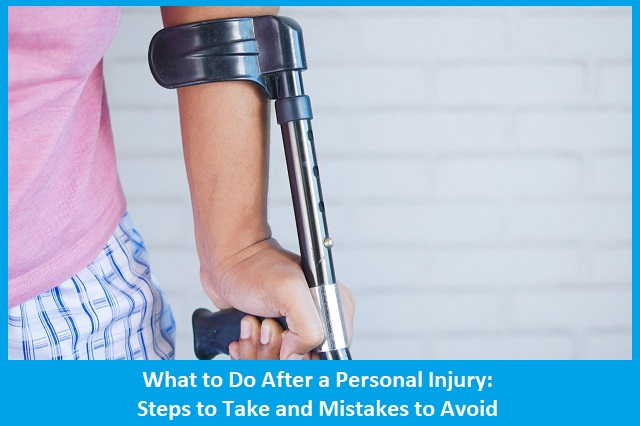Introduction: Experiencing a personal injury can be overwhelming and confusing, but knowing the right steps to take in the immediate aftermath can significantly impact the outcome of your case. This article provides a detailed guide on what to do after a personal injury, including crucial steps to take and common mistakes to avoid. By following these recommendations, you can protect your rights, ensure your safety, and strengthen your potential personal injury claim.

- Seek Medical Attention Immediately:
- Emphasize the importance of prioritizing your health and safety.
- Encourage individuals to seek medical attention promptly, even if injuries seem minor.
- Discuss potential delayed onset injuries and the importance of documenting all symptoms.
- Report the Incident:
- Advise individuals to report the incident to the appropriate authorities, such as the police or property owner.
- Explain the significance of filing an official report for documentation purposes.
- Gather Evidence at the Scene:
- Provide detailed instructions on collecting evidence, including photographs of the scene, injuries, and any property damage.
- Encourage individuals to obtain contact information from witnesses and record their statements if possible.
- Preserve Evidence:
- Explain the importance of preserving evidence, such as keeping damaged clothing or objects and avoiding repairs to property until documented.
- Discuss the potential consequences of tampering with evidence or failing to preserve it properly.
- Keep Detailed Records:
- Advise individuals to keep detailed records of all medical treatment, expenses, and related documents.
- Discuss the importance of documenting lost wages, pain and suffering, and any other damages incurred as a result of the injury.
- Avoid Communicating with Insurance Adjusters:
- Warn against providing recorded statements or signing any documents without consulting a personal injury attorney.
- Emphasize the tactics used by insurance companies to minimize settlements and protect their interests.
- Consult with a Personal Injury Attorney:
- Encourage individuals to seek legal guidance from a qualified personal injury attorney as soon as possible.
- Discuss the benefits of consulting with an attorney, including legal representation, negotiation expertise, and maximizing potential compensation.
- Be Cautious on Social Media:
- Advise individuals to refrain from posting about the incident or their injuries on social media platforms.
- Discuss how social media posts can be used against individuals in personal injury claims and litigation.
Conclusion: Experiencing a personal injury can be a challenging ordeal, but taking the right steps in the aftermath can make a significant difference in the outcome of your case. By following the recommendations outlined in this article, you can protect your rights, preserve crucial evidence, and improve your chances of obtaining fair compensation for your injuries and losses. Remember, seeking legal guidance from a qualified personal injury attorney is essential to navigating the complex legal process and achieving the best possible outcome for your case.
